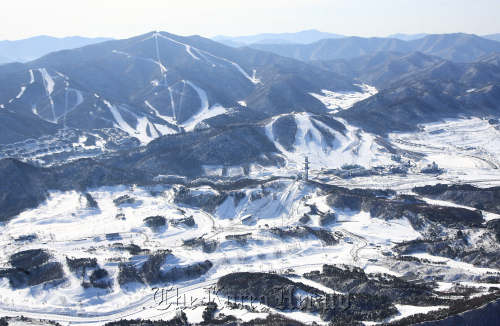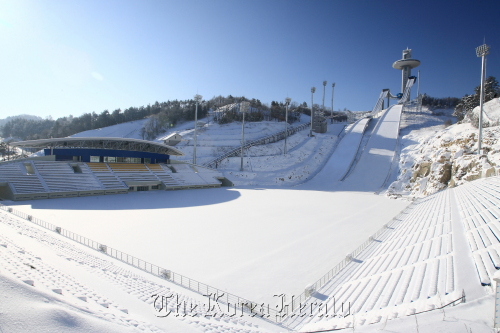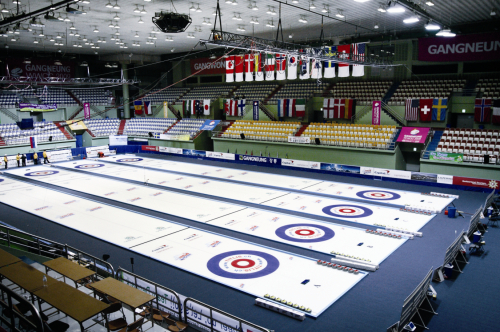IOC evaluation commission makes on-site inspection this week
PYEONGCHANG, Gangwon Province ― Early Saturday morning in PyeongChang local residents were busy clearing streets after 78 centimeters of snow fell in one day ― the most in more than 100 years.
People from almost every home and office were wielding snow shovels, digging the sidewalks and the roads. Some even brought plow trucks to help reduce the workload.
“I’ve never seen such heavy snowfall before. It’s definitely not something you’d expect to see.” said Lee Shin-kyu, 44, a hotel manager.
“We have to clear the roads to get people to travel as safely as soon as possible. There are really important things for us to do next week,” said a truck driver, who said that he had been plowing the snow from 5 a.m.
Most locals were aware that the International Olympic Committee is carrying out on-site inspection here this week for the city’s bid for the 2018 Winter Games.
PyeongChang has failed twice in bids to host the 2010 and also 2014 games, but that doesn’t seem to discourage the residents here.
“We were very unlucky last time. But I think this snowfall is a good sign. I believe the IOC members will be impressed to see the snow-covered PyeongChang,” said Lee.
The locals acknowledged that PyeongChang has changed dramatically in the past 10 years, while making its third attempt to bring the Winter Games here.
One of most notable changes is the Alpensia Resort, which was completed last year with a $1.5 billion investment. “Five years ago, the site was nothing but just huge potato fields,” said Kim won-jin, a taxi driver.
 |
PyeongChang’s Alpensia resort (PyeongChang 2018 Bid Committee) |
But the Alpensia, dubbed as the “Alps of Asia,” now boasts various world-standard sports facilities, including cross country skiing, biathlon and ski jump venues. The ski-jumping tower, in particular, has become a hot spot in the town.
 |
Alpensia Ski Jump Stadium (PyeongChang 2018 Bid Committee) |
From the top of the 160-meter-tall jumping tower, one can fully appreciate the lay out of the resort facilities, including a top-notch hotel, sports venues and a convention center, surrounded by the spectacular mountain scenery in PyeongChang.
Looking at all this from the top of the tower, visitors might wonder why the city has been rejected twice by the IOC. “The Alpensia was only a concept on paper when the IOC members came here last time,” said a spokesman of the PyeongChang bid committee.
PyeongChang was just a small, unknown winter resort town couple of years ago. Some IOC members even confused its name for Pyongyang, the capital of North Korea. But this time, the 11-member IOC commission, chaired by IOC member Gunilla Lindberg of Sweden, will be staying at the five-star Intercontinental Hotel in Alpensia, fully experiencing the state-of-art facilities here, according to the spokesman.
“We’re different now. We’re truly ready to host the Olympics,” he added.
One of the strong points of PyeongChang, compared with other bidders, is that it plans to run the most compact Winter Olympics, according to Kang Kwang-bae, the sports director of the bid committee.
“The main objective of our Winter Games plan is to provide the most compact and efficient environment to athletes,” said Kang.
Kang, a four-time Olympian, will deliver a presentation to the IOC panel this week, explaining PyeongChang’s Winter Games plan and proposed sports venues.
PyeongChang’s 2018 plan is based on two competition clusters ― “Alpensia Cluster,” which will host snow, ski and sliding events, and “Coastal Cluster” in Gangneung, which will stage ice events.
Although the two clusters are 31 kilometers apart, they will be inked to a threefold transport network that includes expressways, national highways and railroads. Also, each Cluster will have its own Olympic village to provide the best environment for athletes, the bid committee noted in its bid book submitted to the IOC.
“All of the venues will be within a 30-minute drive, and athletes will be able to move to and from their competition venues within five to 10 minutes,” said Kang.
Kang also said he believed PyeongChang should win the bid this time for the development of winter sports in Asia. There have been only two Winter Olympics in Asia ― in 1972 and 1998, both in Japan.
 |
The curling venue at Gangneung Ice Rink (PyeongChang 2018 Bid Committee) |
The bid committee insists that bringing the 2018 Winter Games in PyeongChang will not only benefit the regional development of the country but also help boost the popularity of winter sports across Asia.
PyeongChang has seen some good signs already. Last winter season, it saw a whopping 250,000 foreign tourists, mostly from its neighboring countries across Asia. And this year, with the full support from the government and world-wide recognition that it gained from its Olympic bid, more than 290,000 tourists are expected to hit the slopes across Gangwon.
Many here are convinced that PyeongChang is now ready to host the world’s biggest winter sport event.
PyeongChang has already completed seven of the 13 required sites, including biathlon, cross country skiing and also ski jumping venues. And during the past years, the venues have successfully completed test runs by holding world-level competitions, such as FIS ski jumping Continental Cup and snowboard World Cup, receiving full credit from the sports’ governing bodies.
And now, over the course of this week, the IOC delegations are visiting the venues to make a final test before the IOC select the host city for the 2018 Games in July in Durban, South Africa.
During the IOC inspection, thousands of residents here will give a thunderous welcome. The streets are already decorated with dozens of placards, saying “Welcome, IOC Evaluation commission,” and “Yes, PyeongChang.”
But still, some residents are cautiously optimistic as they vividly remember how they closely lost out to Vancouver and Sochi for the 2010 and 2014 Games. In 2007, Kim Seung-hwan, 56, was left crestfallen when PyeongChang lost to Russia’s Sochi by four votes. He went all the way to Guatemala to see the voting.
“I don’t know whether we can win this time, but I just feel we have better chance than before,” Kim said.
“So I’m planning to go to Durban. I want to give my full-support for PyeongChang,” he added.
By Oh Kyu-wook (
596story@heraldcorp.com)










